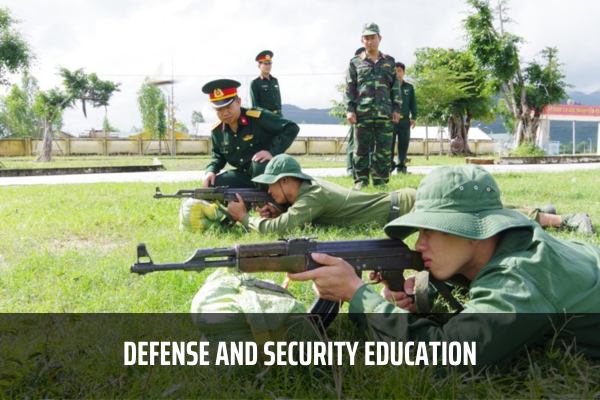Who are compulsory subjects of defense and security education in Vietnam?
- Who are compulsory subjects of defense and security education in Vietnam?
- What are the requirements for National Defense and Security Education in upper secondary schools in Vietnam?
- What are the general orientation of the teaching method for the National Defense and Security Education in upper secondary schools in Vietnam?
Who are compulsory subjects of defense and security education in Vietnam?
Pursuant to the regulations in Article 11 of the Law on National Defense and Security Education 2013, it states the following:
Secondary schools, vocational colleges, and vocational schools
1. National Defense and Security Education in secondary schools, vocational colleges, and vocational schools is a core subject.
2. It ensures that students have initial understanding of the national defense and people's security; the anti-foreign invasion tradition of the nation, the armed forces, and the Vietnamese military art; have basic and necessary knowledge about civil defense and military skills; and are ready to fulfill their military obligations to protect the Motherland.
3. Teaching and learning are organized according to program distribution. During the academic year, based on specific conditions, in coordination with relevant agencies, organizations, and units, students are organized to participate in extracurricular activities with appropriate content and forms of learning.
According to the above regulations, National Defense and Security Education is a core subject for secondary schools, vocational colleges, and vocational schools.

Who are compulsory subjects of defense and security education in Vietnam?
What are the requirements for National Defense and Security Education in upper secondary schools in Vietnam?
Pursuant to Article 4 of the Program accompanying Circular 46/2020/TT-BGDDT, the requirements for National Defense and Security Education in upper secondary schools are as follows:
Requirements for key qualities and general competencies:
National Defense and Security Education contributes to the development of key qualities and general competencies in students, according to the appropriate levels for the subject and educational level as specified in the overall program accompanying the General Education Program issued by the Minister of Education and Training.
Requirements for specific competencies:
National Defense and Security Education contributes to the development of general competencies specified in the overall program through the specific competencies of the subject, which include: awareness of defense and security issues and the application of knowledge and military skills learned to daily life. The requirements for specific competencies are as follows:
Competency | Requirements |
Awareness of defense and security issues | + Explain the role and tasks of defense and security in the construction and protection of the socialist Vietnam; the history and traditions of the Vietnamese People's Armed Forces in the nation-building and defense throughout history; + State the regulations on national defense tasks for the whole people, and the responsibilities of citizens in implementing these regulations; + Analyze and present basic issues related to national sovereignty, national borders; the responsibilities of citizens in protecting national sovereignty and borders in the present day; + State the basic content of the National Defense and Security Education Law, the Vietnamese People's Army Officer Law, the People's Police Law, the Military Service Law, the Road Traffic Law, the Environmental Protection Law, the Cybersecurity Law, etc.; be aware of the prevention of crimes and social evils; regulations on social evils and the responsibilities of citizens in preventing crimes and social evils, both inside and outside of school; + Demonstrate basic skills in following orders; infantry combat techniques, infantry tactics; the use of AK submachine guns, grenades; auxiliary tools and their use, including situations for using these tools; + State the basic content of civil defense, bomb and mine disposal, chemical and biological weapons, high-tech weapons, natural disasters, epidemics, and explosions; observation, listening, detection of enemies, target identification, communication, reporting; know how to find and maintain direction, utilize terrain and apply personal military skills in practicing military skills. |
Application of learned military knowledge and skills to daily life | + Identify the role, position, and tasks of defense and security, and the responsibilities of citizens in fulfilling defense and security tasks; + Fulfill the responsibilities of citizens in protecting and building the homeland according to their age; + Recognize the plots, tactics of hostile forces, crimes, and preventive measures; actively and proactively fight against crime; + Utilize personal abilities, tools, means, and available resources to overcome challenges in life, be prepared to cope with situations involving riots and war; + Demonstrate basic skills in following orders; infantry combat techniques, infantry tactics; know how to use AK submachine guns; observe, listen, detect enemies, identify targets, communicate, report; know how to find and maintain direction, utilize terrain and apply personal military skills in practicing military skills; + Comply with the laws on traffic safety, environmental protection, drug prevention and control, cybersecurity, non-traditional security, and possess skills in disaster prevention and control for oneself and the community; + Demonstrate basic skills in civil defense; + Demonstrate basic skills in bomb and mine disposal, chemical and biological weapons, high-tech weapons, natural disasters, epidemics, and explosions; + Apply knowledge of civil defense, general knowledge of civil defense to daily life. |
What are the general orientation of the teaching method for the National Defense and Security Education in upper secondary schools in Vietnam?
Pursuant to Section 6 of the Program accompanying Circular 46/2020/TT-BGDDT, the general orientation of the teaching method for the National Defense and Security Education in upper secondary schools is stated as follows:
- Promote students' active, proactive, and creative thinking; avoid one-way imposition and rote memorization; focus on developing students' autonomy and self-learning abilities so that they can explore and expand their knowledge, continue to develop the necessary qualities and skills after completing upper secondary school; emphasize the training of skills in applying defense and security knowledge to identify and solve practical problems.
- Apply flexible and creative teaching methods that are appropriate for the educational objectives, content, students, and specific conditions. Teachers can use multiple teaching methods within a theme.
Traditional teaching methods (lectures, dialogues, etc.) are used to promote students' active and proactive learning. Enhance the use of advanced teaching methods based on exploiting scientific and technological achievements in teaching by teachers and students' learning, especially the application of the ongoing digital technology revolution, information, and communication to enhance students' role as active learners (discussions, role-plays, practical exercises, etc.). The forms of organizing teaching are diverse and flexible, combining individual and group learning, classroom learning, and out-of-class learning.
Teachers teaching and students studying the National Defense and Security Education course need to have the skills to explore and refer to knowledge about national defense and security domestically and internationally through the official electronic information portals licensed by the Ministry of Information and Communications on the internet, in order to reinforce, supplement, and timely update new knowledge, serving the process of learning, research, and teaching.
LawNet
